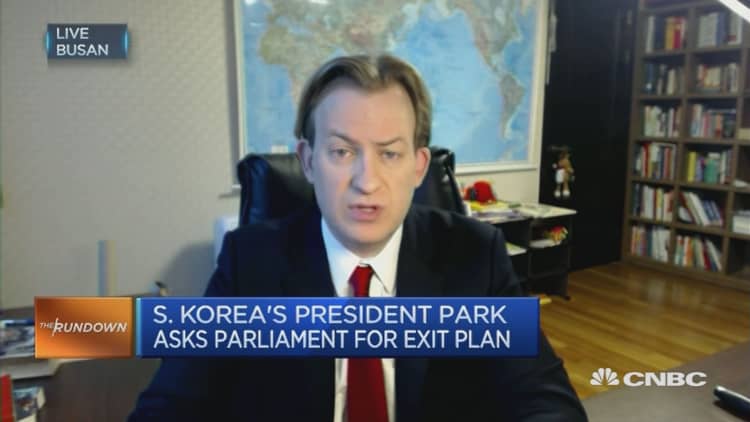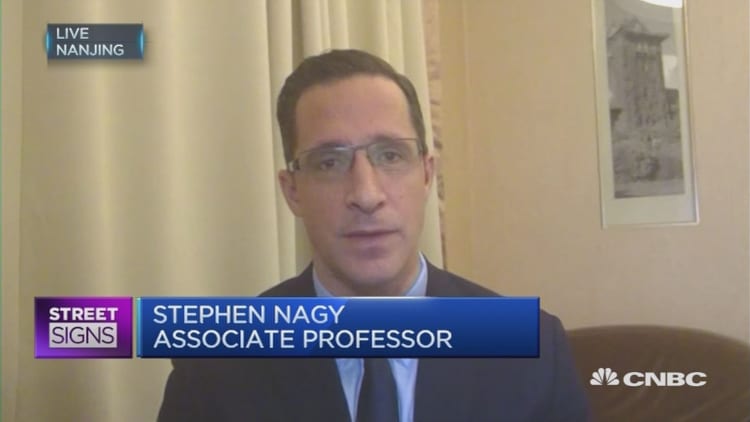


South Korea's promise to host advanced American missile defense technology on its soil may fall apart following President Park Geun-hye's de-facto resignation.
In July, Park's ruling Saenuri party agreed to host the Terminal High Altitude Area Defence system (THAAD), designed to shoot down ballistic missiles, as a counter to the growing sophistication of North Korea's weapons program.
Seoul and Pyongyang fought a three-year conflict that ended with a ceasefire in 1953. But North Korea issues frequent threats to its southern neighbor. In September, North Korea said it tested a miniaturized nuclear warhead that was reportedly the country's largest test to date.
Park's embrace of THAAD angered China and Russia, who contend its deployment on the Korean Peninsula threatens their respective national security interests.
South Korea's main opposition parties, the People's Party and Minjoo Party, are also opposed to THAAD, claiming that it won't effectively protect against the North, while seriously damaging relations with Beijing.
"The opposition has long believed that a confrontational stance toward the North is counterproductive, and needs to be balanced with greater engagement," explained Stephan Haggard, director of the Korea-Pacific program at the University of California San Diego.
The opposition's stance has some public support; the southern town of Seongju was chosen as the site for THAAD deployment but local citizens have rallied against the idea amid concerns about their homes becoming military targets.
Opposition politicians also don't wish to anger the world's second largest economy and Seoul's largest trading partner, Haggard added.
But with President Park now headed towards the exit door, the opposition has a chance of winning greater political control and that could threaten THAAD's future.
On Tuesday, Park announced she was relinquishing her powers amid her alleged involvement in an influence-peddling offense that sparked large-scale anti-government protests. Parliament, known as the National Assembly in South Korea, will now be deciding Park's fate, including whether she resigns before her original term ends in February 2018.
Presidential elections were originally slated for December 2017 but if parliament decides that Park's official resignation will take place in March or April, elections could be pushed forward to mid-year, Nomura said in a Tuesday note.
Park can't resign immediately as that would result in an election within the next 60 days, and neither the ruling nor opposition parties currently have strong candidates.
The extent of public disillusionment with Park's Saenuri party, who has a history of corruption scandals, could help elect an opposition President.
"As we can see in the U.K., the U.S., the Philippines, and other countries around the world, reactionary politics can be a very powerful force that brings about dramatic changes," said Harry Sa, a research analyst specializing in defence at Singapore's Nanyang Technological University.
"If the opposition party wins, and prioritizes relations with the Chinese [as expected], there's a very real chance the decision to deploy THAAD will be overturned."
"If THAAD isn't deployed during Park's now-possibly shortened term, her likely liberal successor might just kill it, making it another potential casualty of this bizarre Choi Soon-sil scandal," echoed Sean King, senior vice president at research firm Park Strategies.
Washington isn't too concerned about the impact of Park's exit. On Tuesday, the U.S. Defense Department said THAAD deployment would continue regardless of the country's political situation, Yonhap News reported.
Still, it won't be so easy for the opposition to block THAAD.
A large part of the National Assembly and the defence establishment still firmly supports THAAD, so there will be some institutional resistance, Sa noted.
Secondly, the opposition may not want to endanger the Korea-U.S. relationship.
"There is certainly a chance that blocking deployment of THAAD will be a long-run objective, or creating conditions under which it would not need to be deployed. But an incoming president and opposition party will need to think about its broader relationship with the U.S. and might be cautious at the outset," explained Haggard.
Under an opposition presidency, THAAD won't be the sole policy from Park's administration to be chucked out.
"Park's entire legacy is fair game. That includes the comfort women deal signed late last year and the intelligence sharing agreement (GSOMIA) signed only a few days ago. Both were signed with Japan," Sa warned.

